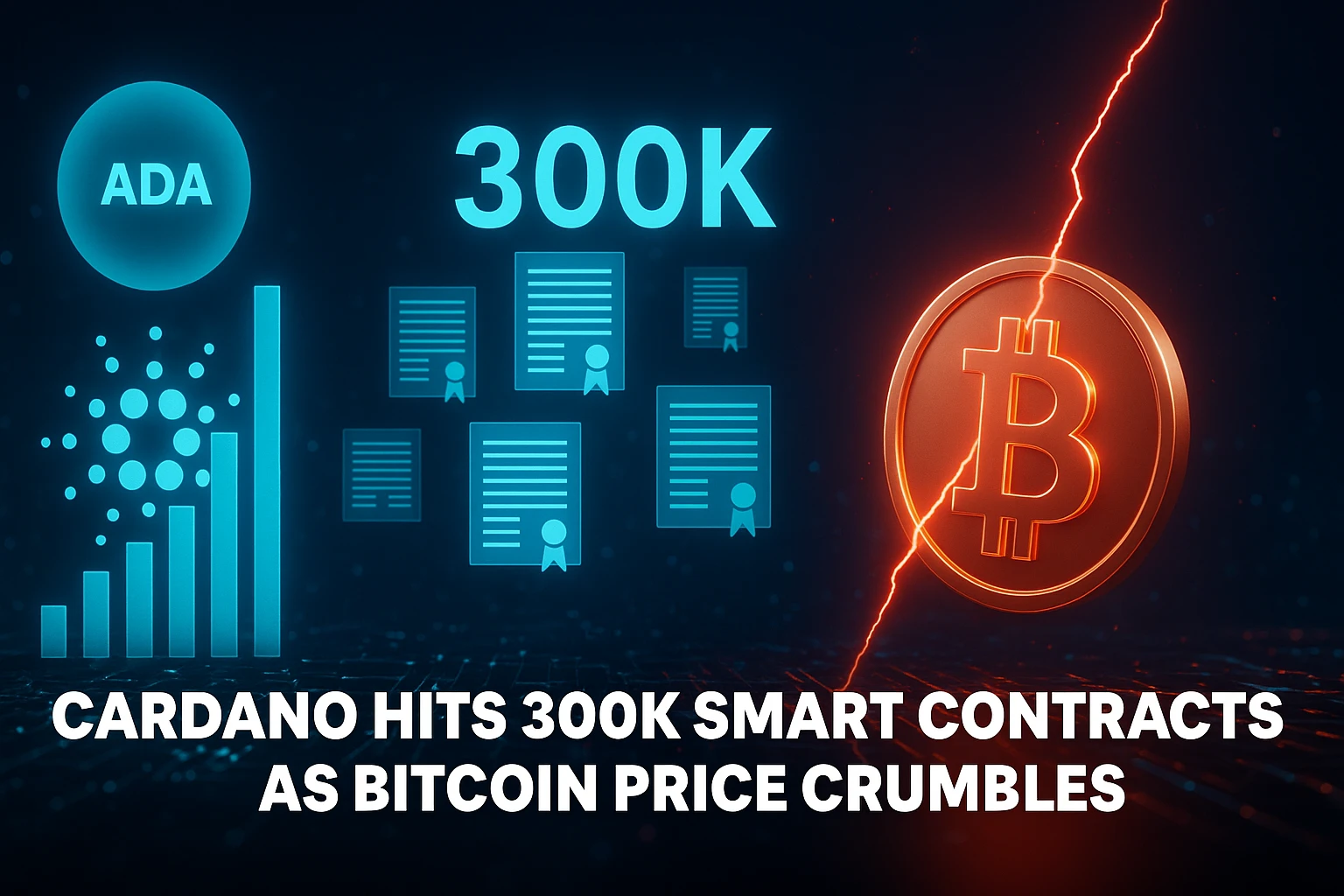Cardano Hits 300K Smart Contracts as Bitcoin Crumbles Under Market Pressure

Cardano has hit a significant blockchain milestone this week by going through 300,000 live smart contracts on its mainnet. This breakthrough validates the platform’s increasing adoption and showcases the network’s ability to scale with large-scale decentralized applications. While this feat was being achieved, Bitcoin took an immense price drop as it slipped 3% below $115,000 amid fresh concerns over worldwide trade tariffs.
- Cardano Marks Historical Smart Contract Development
- Bitcoin Struggles with Slump Fueled by Trade Tariff Fears
- Growing Gap between Blockchain Efficiency and Market Response
- Developers Choose Scalable Networks for Long-Haul Projects
- Conclusion: Blockchain Design Matters More Than Ever
- Frequently Asked Questions (FAQs)
- Glossary of Key Terms
The two stories paint an intriguing comparison for the modern cryptocurrency landscape, revealing how the design of the network and consensus mechanisms may foster growth as well as offer stability.
Cardano Marks Historical Smart Contract Development
So far, Cardano has witnessed more than 300,000 smart contracts being activated using its mainnet, as reported by The Crypto Basic. Most of the contracts are created from the platform’s own native libraries for smart contracts, Plutus V1 and Plutus V2. The sheer jump in on-chain usage is an indicator of an active developer ecosystem working on building scalable and performing blockchain applications.
Among the core enablers for this momentum has been the adoption of Delegated Proof of Stake by Cardano. Compared to older consensus models, DPoS allows Cardano to transact at high efficiency by selecting validators through stakeholder delegation with high throughput and energy efficiency. The system has been instrumental in ensuring network efficiency despite increasing volumes of deployed contracts.
ALSO READ: Cardano Gets a Swipe at Apple Pay Amid TRON’s Regulatory Power Play on Nasdaq
Not only does the Delegated Proof of Stake system facilitate scalability seamlessly, but it also ensures the blockchain’s decentralization principle through the encouragement of community participation in network security. With over 300,000 active smart contracts now, Cardano’s platform demonstrates the advantage of a DPoS-based system in making blockchain real-world applications feasible.
Bitcoin Struggles with Slump Fueled by Trade Tariff Fears
While Cardano made history with an impressive milestone, the price movement of Bitcoin presented an entirely separate story. Based on Economies.com data, Bitcoin dropped by 3% to $114,450 on August 1. The decline happened as there were renewed fears of new tariffs and potential disruptions of world trade. This latest adjustment of the price is another factor adding to the trend for Bitcoin to significantly respond to macroeconomic events and show vulnerability to outside disruptions.
Unlike Cardano’s Delegated Proof of Stake configuration, Bitcoin continues to be reliant on Proof of Work, a method less adaptive to scaling under rapid market change and requiring more energy. The fall in price serves as a reminder that such networks with non-scalable and inefficient mechanisms of consensus are potentially at greater risk of volatility under global economic stress.
Cardano’s continued momentum, as it draws upon its DPoS-derived design, stands in contrast to Bitcoin’s responsiveness to market sentiment. Where one storied standard of value remains Bitcoin, Cardano is positioning itself as a high-performance platform for the creation of decentralized applications.
Growing Gap between Blockchain Efficiency and Market Response
The divergence of Cardano’s rise and the decline of Bitcoin highlights an emerging trend in the blockchain space. In an ongoing cryptocurrency ecosystem evolution process, the technical building blocks of respective networks matter all the more. In this regard, the efficiency offered by Delegated Proof of Stake becomes all the more significant for sustainable development.
ALSO READ: TRON Celebrates Nasdaq Debut, Dethrones Cardano as the 9th Largest Digital Currency
The ability of Cardano to process hundreds of thousands of contracts without network congestion or higher transacting fees is all thanks to its DPoS system. Transactions are validated by elected stake pool operators, enabling fast finality as well as reduced resource consumption. This has enabled developers to effortlessly deploy and take advantage of smart contracts, knowing the network can scale up to accommodate them.
Meanwhile, the Bitcoin system of Proof of Work, though secure, has throughput and flexibility limitations. The structural differences come into sharper relief as market forces, such as trade tensions, introduce volatility into the system.
Developers Choose Scalable Networks for Long-Haul Projects
Cardano’s increasing usage of smart contracts marks something greater than figures of growth, but an evolution of developer preferences. Over 300,000 contracts now run on its mainnet, and the network has increasingly been the go-to platform of choice for developers building projects in the arenas of decentralized finance, governance, and digital assets.
The speed this facilitates is due largely to the Delegated Proof of Stake system upon which Cardano is built. By simplifying the process of finding agreement and spreading control among stakeholders, DPoS ensures the network remains both quick and safe as traffic increases. Developers are taking notice and are continuing to develop on platforms dedicated to speed and long-term success.
The ongoing rise of smart contracts also suggests Cardano is retaining developers and enabling ongoing innovation. This differs from some networks where development has spikes and then plateaus. The ongoing upward movement of the Cardano count of smart contracts suggests an architecture both scalable and sound, this being enabled by the application of Delegated Proof of Stake.
ALSO READ: TRON Beats Ethereum in Transfers Amid an 83% Jump in Cardano ETF Approval Odds
Conclusion: Blockchain Design Matters More Than Ever
More than 300,000 live smart contract usage recorded by Cardano is one of its landmark achievements, and it has been achieved using a scale and speed-enabled consensus design. The aspect that Delegated Proof of Stake has allowed the network to accommodate rising demand with security and with high efficiency has been interesting. While the world market falters as uncertainty from trade causes the sudden fall of Bitcoin by 3%, the contrasting fortunes of the other two of the most prominent cryptos indicate the growing importance of blockchain infrastructure.
With its adaptive and resource-saving DPoS system, Cardano continues to gather momentum as an ideal development platform. During times of market uncertainty, the performance and security benefits brought by Delegated Proof of Stake could come to characterize the next phase of blockchain adoption.
Frequently Asked Questions (FAQs)
- What latest achievement has Cardano made?
Cardano has passed 300,000 live smart contracts on its mainnet.
- What caused Bitcoin’s price to drop below $115,000?
Bitcoin fell 3% as renewed global trade tariff fears triggered market turbulence.
- How does Cardano process transactions quickly?
Cardano uses a Delegated Proof of Stake (DPoS) system and selects validators through stakeholder delegation, enabling high performance and scalability.
- What is Plutus?
Plutus is the original smart contract development language of Cardano, and comes in V1 and V2 variants, meant for developing scalable dApps.
- Does economic news affect Bitcoin more significantly than other cryptos?
The price of bitcoin gets impacted by macroeconomic developments such as trade policy since it’s a market-leading asset.
Glossary of Key Terms
- Cardano—Third-generation blockchain platform committed to scalability, interoperability, and sustainability. It has a distinct consensus technique also referred to as Delegated Proof of Stake (DPoS), and offers smart contracts and blockchain applications.
- Smart Contract—A self-executing digital contract with the terms embedded directly into code. The contract self-executes on the blockchain as soon as requirements are met.
- Mainnet— The entire live and working copy of a blockchain upon which real-world transactions occur, as opposed to an individual’s development and testing copy, whose name is the testnet.
- Plutus—Cardano’s native smart contract construction platform. The most popular versions are Plutus V1 and V2, and they enable devs to design and deploy contracts on the Cardano blockchain.
- Delegated Proof of Stake (DPoS)—A proof-of-stake system in which stakeholders delegate their tokens to validators (stake pool operators), and the operators are responsible for verifying transactions and building blocks. It is very energy-efficient and scalable.
- Consensus Mechanism—The process by which blockchain networks achieve agreement on the validity of transactions. Examples include Proof of Work (PoW) and Delegated Proof of Stake (DPoS).
- Stake—Anyone with tokens on the DPoS-based blockchain and capable of delegating the stake to validators to help with network security.
- Validator / Stake Pool Operator—Node on a DPoS blockchain responsible for verifying transactions and adding new blocks. In Cardano, they are known as stake pool operators.
- Bitcoin—First and most well-known cryptocurrency, employing the system of consensus known as Proof of Work. It serves as a medium of exchange and as a decentralized store of value.
- Tariff Concerns—Economic policies involving taxes on imported goods. In the cryptocurrency space, these concerns could catalyze market volatility and investor sell-offs, impacting the values of digital assets like Bitcoin.




